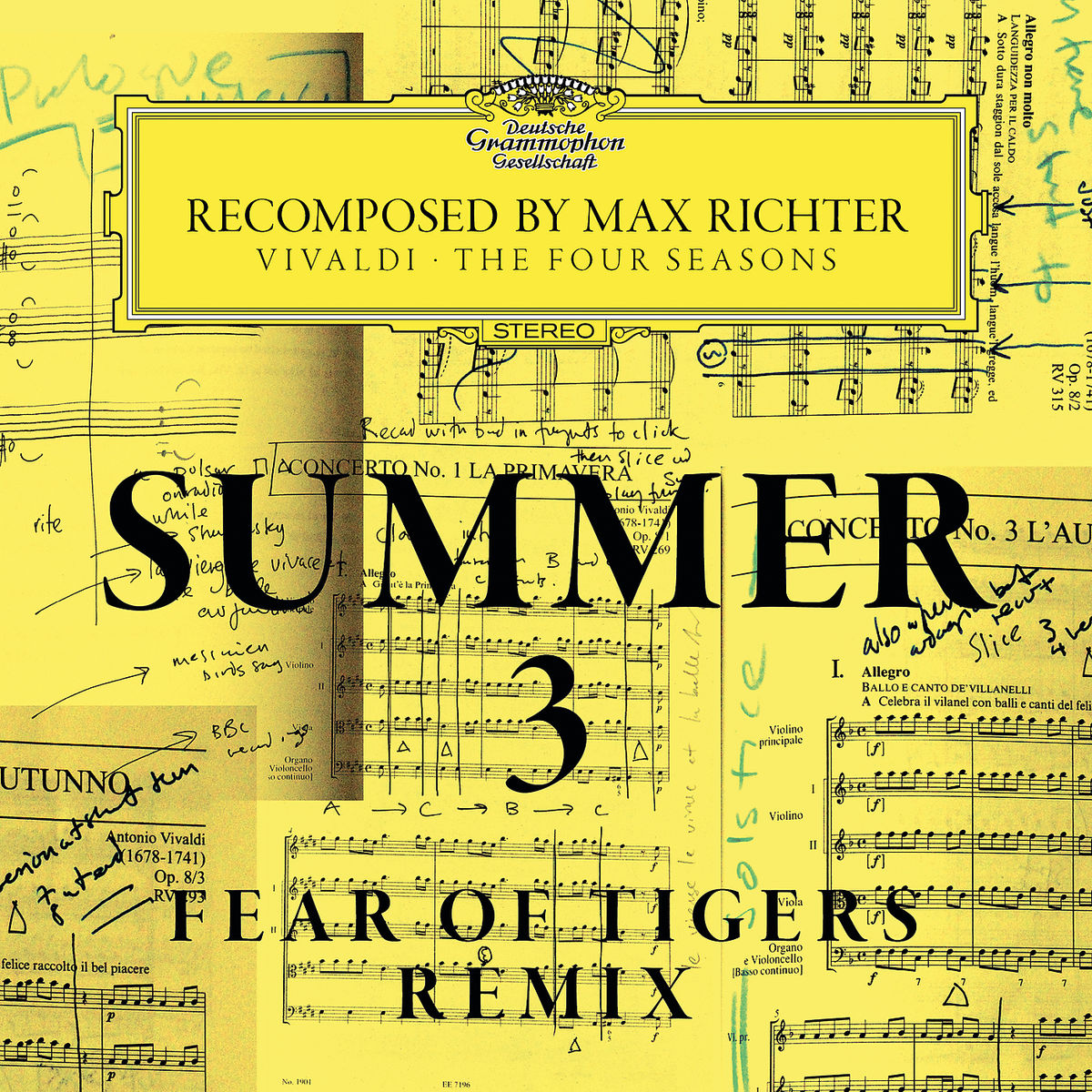Richter Four Seasons
Review by: David Hurwitz
- Max Richter Four Seasons Vinyl
- Max Richter Four Seasons
- Youtube Max Richter Four Seasons
- Max Richter Four Seasons
Take a look at the cover. This is the most classic-looking DG release in many a year, which should immediately raise suspicions. Obviously the intent, using one of classical music’s most iconic label marquees, is to endow decomposer Max Richter with a commercial pedigree similar to that enjoyed musically by the object of his current affections (affectations?), Vivaldi’s The Four Seasons. Now let’s face it, Vivaldi is not the most intellectual of composers to begin with, so it’s fair to ask if there is anything to be gained by dumbing down the music to the degree that happens here.
Richter discarded about three-quarters of Vivaldi's original and substituted his own music. He also added some subtle electronics. For me, it worked, but purists may be appalled. Richter loved the Four Seasons growing up but he grew tired of it. Max Richter’s stunning 2012 “recomposition” of The Four Seasons is already recognised as a contemporary classic. Three-quarters of Vivaldi’s original is discarded, absorbing and recasting the remaining material into the loops and phases of Richter’s own neoclassical, minimalist style. German-born British composer Max Richter created a postmodern and minimalist recomposition, Recomposed by Max Richter: Vivaldi - The Four Seasons. Working with solo violinist Daniel Hope, Richter discarded around 75 per cent of the original source material; the album is 44 minutes long.

What Richter has done in some of these twelve movements is to take a bit of the original—the solo violin birdsong in the first movement of “Spring” for example—and repeat it mindlessly over a pop-ish chord progression. In the slow movements he may preserve the melody but randomly alter the original accompaniment and harmonic framework. In all cases Vivaldi’s carefully designed forms and schemes of color and contrast, as well as his programmatic intentions, are pretty much destroyed. Is the finale of “Autumn” a rustic dance? Does the music in the central movement of “Winter” skate gracefully over the ice? I don’t think so. None of this would matter if something equally interesting replaced the original concept, but nothing does.
- MAX RICHTER ‘s version of The Four Seasons was what I was looking forward to most. And now that I finally listen to these amazing tunes, I feel like my grand-grand-parents sit by my side, we drink coffee and have the talk of our lifes about all the things we never had the chance to talk about.
- Recomposed: Vivaldi – The Four Seasons 2012 Deutsche Grammophon Despite discarding 3/4ths of Vivaldi’s original material in his Recomposition of The Four Seasons, Max Richter considered the Italian composer’s musical DNA as omni-present in the reworking of the material.
Let me make one thing clear: I have no problem with transcriptions, or with one composer’s take on another, or even a Dadaist painting of moustaches on musical Mona Lisas. Musical culture is full of such things, from Mozart’s updated Handel arrangements, through Respighi, Stravinsky, Berio, and Olav Anton Thommessen’s brilliantly demented Macrofantasy on Grieg’s Piano Concerto. Each needs to be judged on its own merits. It is a cheap shot to say that Max Richter is no Vivaldi (never mind Stravinsky or Respighi). On that count posterity will judge. I will say, however, that about 15 years ago DG tried a similar stunt with a compositional non-happening named Todd Levin. Is anyone discussing him now?
No, the main issue here is whether or not Richter’s originality of treatment offers a fresh take on his borrowed material. As the above brief description suggests, it does not. This disc is a bore, plain and simple. Richter brings virtually nothing to the party, unless turning Vivaldi into a sort of annoying elevator music appeals to your sensibilities. The element of opportunism in all of this thus becomes relevant also. There’s a certain hubris in hitching your name to Vivaldi’s single most popular work. That is what got Richter his interview on NPR—his conceptual daring, and not the actual sound of the music.
At best, then, what we have here is a lesson in clever promotion and public relations, and little more. As a musical experience, however well played by violinist Daniel Hope and the larger ensemble, this is a nullity. So what’s next Mr. Richter, Carmina Burana? Eine kleine Nachtmusik? Pachelbel’s Canon? Boléro? So many lovely works demanding “the treatment”, and so many elevators…
Max Richter Four Seasons Vinyl
Recording Details:
Max Richter Four Seasons
Album Title: RECOMPOSED BY MAX RICHTERReference Recording: None for this decomposition
- VIVALDI, ANTONIO:
- Hope, Daniel (violin)
- Ridder, André de (conductor)
- Deutsche Grammophon - 476 5040
- CD

Share This Review:
Recomposed by MAX RICHTER – Vivaldi – “The Four Seasons”
01. Spring 0
02. Spring 1
03. Spring3
04. Summer 1
05. Summer 2
06. Summer 3
08. Autumn 1
09. Autumn 2
10. Autumn 3
11. Winter 1
12. Winter 2
13. Winter 3
Youtube Max Richter Four Seasons
Time for classical music. I always loved The Four Seasons by VIVALDI. Maybe because they remind me of my childhood, sind this was one of the vinyls my grand-grand-parents used to listen – a lot. They are gone, but the Seasons remained. Now MAX RICHTER recomposed VIVALDI’s The Four Season and to be honest: this is the release I was most looking forward to this year. Yes, MAX RICHTER‘s Recomposed – neither YEASAYER nor the PET SHOP BOYS – not even MUSE. MAX RICHTER‘s version of The Four Seasons was what I was looking forward to most. And now that I finally listen to these amazing tunes, I feel like my grand-grand-parents sit by my side, we drink coffee and have the talk of our lifes about all the things we never had the chance to talk about.
Maybe some works are so familiar that it seems almost impossible to hear them afresh, but that is what MAX RICHTER has achieved with Vivaldi “Recomposed”. This is no mere arrangement; instead MAX RICHTER has absorbed VIVALDI’s The Four Seasons into his own musical bloodstream.
“I wanted to open up the score on a note-by-note level, and working with an existing recording was like digging a mineshaft through an incredibly rich seam, discovering diamonds and not being able to pull them out. That became frustrating. I wanted to get inside the score at the level of the notes and in essence re-write it, re-composing it in a literal way.”
MAX RICHTER calculates that, in the process, he has discarded around three-quarters of VIVALDI’s original. He opens with what he describes as “a dubby cloud which I’ve called Spring 0. It functions as a sort of prelude, setting up an electronic, ambient space for the first Spring movement to step into. I’ve used electronics in several movements, subtle, almost inaudible things to do withthe bass, but I wanted certain moments to connect to the whole electronic universe that is so much part of our musical language today.” Other resonances are no less unexpected: MAX RICHTER describes part of the first movement of his Summer as:
“heavy music for the orchestra. It’s relentless pulsed music, which is a quality that contemporary dance music has; and perhaps I was also thinking about John Bonham’s drumming. Then, in the second movement of Autumn I asked the harpsichordist Raphael Alpermann to play in what is a rather old-fashioned way, very regularly, rather like a ticking clock. That was partly because I didn’t want the harpsichord part to be attention-seeking, but also because that style connects to various pop records from the 1970s where the harpsichord or Clavinet was featured, including various Beach Boys albums and the Beatles’ Abbey Road.”
Clearly, MAX RICHTER has brought his own frame of reference to the project. As he says,
“Vivaldi’s music is made of regular patterns, and that connects with post-minimalism, which is one strand in the music that I write. That felt like a natural link, but even so it was surprisingly difficult to navigate my way through it. At every point I had to work out how much is Vivaldi and how much is me. It was difficult but also rewarding because the raw material is so fascinating.”

Just as MAX RICHTER’s Seasons plays tricks with the way we hear VIVALDI’s original, so it also asks questions of the soloist, DANIEL HOPE.
“Violinists have Vivaldi’s The Four Seasons hardwired in their brain. Best of tool torrent. Daniel is likely to play the original I don’t know how many times in a year, and for him to have my parallel text going on in another part of his brain is a challenge. I think he did a wonderful job. He brought to it a deep engagement with the original, but he was fully prepared to cut this new swathe through the text.”
MAX RICHTER not only shows how to put hope and passion into music and to express it through music, he also shows that classical music can work for young people, too. Listen to the album snippets and fall in love:

Max Richter Four Seasons
––
MAX RICHTER
[one_half last=”no”] Download os x el capitan app store.
classic
from Germany / UK
[/one_half]
[one_half last=”yes”]
Facebook | Homepage | Twitter
[/one_half] Rar extractor mac download.
